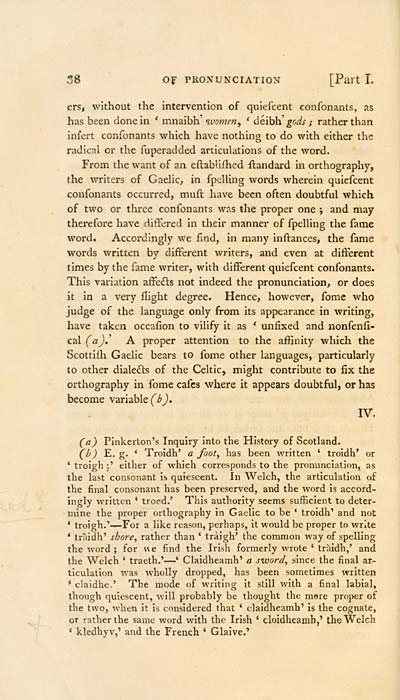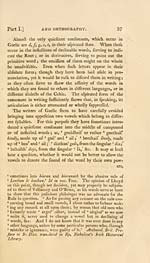Download files
Complete book:
Individual page:
Thumbnail gallery: Grid view | List view

38 Of PKoxuNciATio^f [Part I.
ers, without the intervention of quiefcent confonants, as
has been done in ' mnaibh' ivomen, * àeih\\ gods ; rather than
infert confonants which have nothing to do with either the
radical or the fuperadded articulations of the word.
From the want of an eftablifhed ilandard in orthography,
the writers of Gaelic, in fpcUing words wherein quiefcent
confonants occurred, muft have been often doubtful which
of two or three confonants was the proper one ; and may
therefore have differed in their manner of fpelling the fame
word. Accordingly vee find, in many inftances, the fame
words written by different writers, and even at different
times by the fame writer, with different quiefcent confonants.
This variation affedis not indeed the pronunciation, or does
it in a very flight degree. Hence, however, fome who
judge of the language only from its appearance in writing,
have taken occafion to vilify it as * unfixed and nonfenli-
cal (a).'' A proper attention to the affinity which the
Scottifh Gaelic bears to fome other languages, particularly
to other dialefts of the Celtic, might contribute to fix the
orthography in fome cafes where it appears doubtful, or has
become variable fZ-J.
IV.
(a) Pinkeiton's Inquiry into the History of Scotland.
(I?) E. g. ' Troidh' a Joot, has been written ' troidh' or
' troigh :' either of which corresponds to the pronunciation, as
the last consonant is quiescent. In Welch, the articulation of
the final consonant has been preserved, and the word is accord-
ingly written ' troed.' This authority seems sufficient to deter-
mine the proper orthography in Gaelic to be ' troidh' and not
' troigh.' — For a like reason, perhaps, it would be proper to write
* traidh' shore, rather than ' tràigh' the common way of spelling
the word ; for v\e find the Irish formerly wrote ' traidh,' and
the Welch * traeth.' — ' Claidheamh' a sword, since the final ar-
ticulation was wholly dropped, has been sometimes written
* claidhe.' The mode of wrhing it still with a final labial,
though quiescent, will probably be thought the more proper of
the two, when it is considered that ' claidheamh' is the cognate,
or rather the same word with the Irish * cloidheamh,' the Welch
* kledhyv,' and the French ' Glaive.'
ers, without the intervention of quiefcent confonants, as
has been done in ' mnaibh' ivomen, * àeih\\ gods ; rather than
infert confonants which have nothing to do with either the
radical or the fuperadded articulations of the word.
From the want of an eftablifhed ilandard in orthography,
the writers of Gaelic, in fpcUing words wherein quiefcent
confonants occurred, muft have been often doubtful which
of two or three confonants was the proper one ; and may
therefore have differed in their manner of fpelling the fame
word. Accordingly vee find, in many inftances, the fame
words written by different writers, and even at different
times by the fame writer, with different quiefcent confonants.
This variation affedis not indeed the pronunciation, or does
it in a very flight degree. Hence, however, fome who
judge of the language only from its appearance in writing,
have taken occafion to vilify it as * unfixed and nonfenli-
cal (a).'' A proper attention to the affinity which the
Scottifh Gaelic bears to fome other languages, particularly
to other dialefts of the Celtic, might contribute to fix the
orthography in fome cafes where it appears doubtful, or has
become variable fZ-J.
IV.
(a) Pinkeiton's Inquiry into the History of Scotland.
(I?) E. g. ' Troidh' a Joot, has been written ' troidh' or
' troigh :' either of which corresponds to the pronunciation, as
the last consonant is quiescent. In Welch, the articulation of
the final consonant has been preserved, and the word is accord-
ingly written ' troed.' This authority seems sufficient to deter-
mine the proper orthography in Gaelic to be ' troidh' and not
' troigh.' — For a like reason, perhaps, it would be proper to write
* traidh' shore, rather than ' tràigh' the common way of spelling
the word ; for v\e find the Irish formerly wrote ' traidh,' and
the Welch * traeth.' — ' Claidheamh' a sword, since the final ar-
ticulation was wholly dropped, has been sometimes written
* claidhe.' The mode of wrhing it still with a final labial,
though quiescent, will probably be thought the more proper of
the two, when it is considered that ' claidheamh' is the cognate,
or rather the same word with the Irish * cloidheamh,' the Welch
* kledhyv,' and the French ' Glaive.'
Set display mode to: Large image | Transcription
Images and transcriptions on this page, including medium image downloads, may be used under the Creative Commons Attribution 4.0 International Licence unless otherwise stated. ![]()
| Early Gaelic Book Collections > Blair Collection > Elements of Gaelic grammar > (68) |
|---|
| Permanent URL | https://digital.nls.uk/79040791 |
|---|
| Description | A selection of books from a collection of more than 500 titles, mostly on religious and literary topics. Also includes some material dealing with other Celtic languages and societies. Collection created towards the end of the 19th century by Lady Evelyn Stewart Murray. |
|---|
| Description | Selected items from five 'Special and Named Printed Collections'. Includes books in Gaelic and other Celtic languages, works about the Gaels, their languages, literature, culture and history. |
|---|

